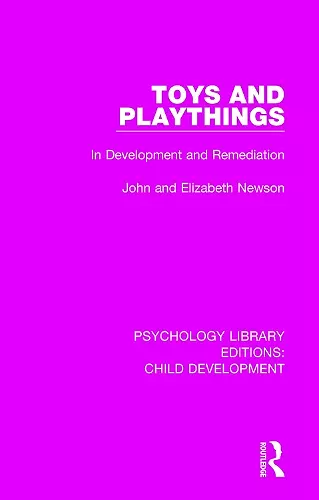Toys and Playthings
In Development and Remediation
John Newson author Elizabeth Newson author
Format:Paperback
Publisher:Taylor & Francis Ltd
Published:11th Nov '19
Currently unavailable, and unfortunately no date known when it will be back
This paperback is available in another edition too:
- Hardback£130.00(9781138505971)

John and Elizabeth Newson were well known for their studies of child rearing, which have combined a rigorous research methodology with sympathetic insights into family life and a lively approach to scientific reporting. ‘Path-breaking’, ‘brilliant’, ‘seminal’, ‘outstanding’, ‘fascinating’, ‘enthralling’ and ‘enchanting’ are some of the adjectives used by critics to describe their previous books.
They now turn their attention to toys, the ‘pegs on which children hang their play’, a study for which they are uniquely qualified. Not only had they long experience in normal child development: they had been actively involved for many years in research and training in remedial play for disabled children, their research unit was a major influence in the phenomenal development of the toy libraries self-help movement, they designed for and advised the toy industry, and they had their own family-run specialist toyshop.
With this background, it is not surprising that their book on toys and playthings is both informative and entertaining on many different fronts. Richly observant, it follows the child’s development in play from using the mother or father as the ‘first and best toy’, through the exploratory and manipulative sequences, to the use of toys in ritual, symbolic or contemplative ways. Against this detailed understanding of ‘ordinary’ children’s growth points in play, the Newsons and their collaborators examine the special needs of disabled children, with a firm emphasis on how parents can help. What is more, in providing an intensely practical guide for the parents and teachers of the disabled child, they draw out comparative insights which are enlightening and absorbing for those whose children do not have such urgent problems.
Once again the Newsons share with the reader the viewpoints and preoccupations of research workers in the field. There is indeed a continual sense of ‘work in progress’, and nowhere more than in the chapter on using toys for developmental assessment, where the reader is given a hot line to a laboratory (i.e. playroom) notes used in their own research unit at the time in a welcome move away from the rigid test-bound assessment of ‘special’ children. The book is enriched by the authors’ sharp awareness that the history of playthings has a far longer perspective than the history of child psychology. They are not basically interested...
ISBN: 9781138506237
Dimensions: unknown
Weight: 453g
284 pages